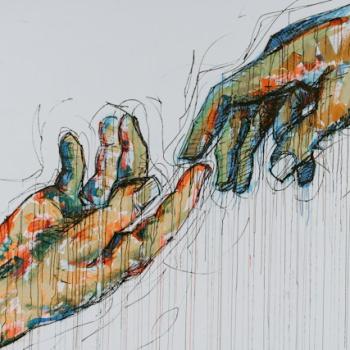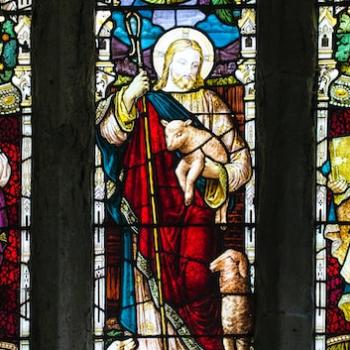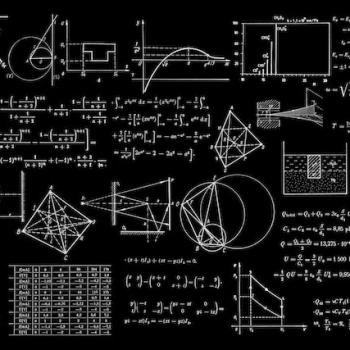Palm Sunday invites us to follow Jesus on his journey to the cross and beyond during Holy Week. As we prayerfully undertake this pilgrimage inside our hearts, let’s also journey together toward an understanding of the Christian faith in a language that makes sense in the modern world.

Human language is nothing short of miraculous. The fact that I can use this tool to download my own thoughts and feelings and upload them to you is mind-blowing. For a person like me who can’t read a map, wrap a present, or trim her bangs without disappointing results, the very fact that I can use language to convey my own conscious experience of the world to you and learn about yours in return seems like an almost superhuman skill.
The Limits of Language
At the same time, though, the limitations of language may be our most significant innate deficit as a species. If we don’t have a word for something, is it really a “thing?” For instance, I’m aware of no word in English that describes that moment of confusion when you pull up to a four-way stop at the same time as another car. It’s unclear whose turn it is, so you both go simultaneously. And then you both stop suddenly. And sit there awkwardly. And then you both go again at the same time again.
Maybe we don’t need a word for such a traffic conundrum. But there’s another kind of traffic we lack a vocabulary for and truly need. I don’t think we have a word in English for the experience of discovering that the religious faith of one’s childhood fails to stand up to what we know from science and our own lived experiences of the world. And because of that realization, we are tempted to give up on religion entirely, but something in us leads us to believe that there truly is much more to life than what we perceive with our senses.
Language and Sense
We sense on some level that Life needs a capital letter to be understood correctly, but we don’t know how to explain why. And although we know it doesn’t make logical sense to trust this internal “sense” in the face of your commitment to follow the “science,” you still feel that this sense is a North star worth following.
But the conflict between the two makes us angry at organized religion even though we feel a need to defend it and tired – bone tired – because we have tried to figure this out but are out of our depth. I would like to have a word for this. It would be my favorite word.
As Ludwig Wittgenstein wrote, “The limits of my language are the limits of my world.”
Differing Definitions
Worse than such “lexical gaps,” as they are called, are the words we DO have, but people understand their definitions differently. Take words like love, peace, freedom, justice, and many more. If you and I mean different things when we use these terms, how can we ever come to a place of shared understanding?
Of course, the realm of religious faith probably suffers more from this lack of agreement on what words mean than any other area of life. Words like God, faith, prayer, sin, heaven, and divine, to name just a few, are understood differently not just by religions themselves but by each individual within a religious group that claims to share the same creed.
Go ahead; I dare you. Go out on a busy street, tell people you’re doing research for an article, and ask them to define “God.” Think about the likely responses you’ll get. You won’t be out there very long.
Palm Sunday and Being Human
The gospel readings on Palm Sunday in all three cycles always make me think about the limitations of language. Two words are particularly difficult in light of these readings: human and divine. We often think these words are opposites. I’m not so sure.
In each cycle of the lectionary, the gospel on Palm Sunday tells the lengthy story of Jesus’ Last Supper, Judas’ betrayal, the “agony in the garden,” Peter’s denial, and Jesus’ arrest, journey to Calvary, and death. While a few details differ in Matthew, Mark, and Luke’s versions, the stories are essentially the same.
They all show Jesus at his most vulnerable. He’s visibly hurt by Judas’ betrayal and Peter’s denial. He’s discouraged when the apostles can’t even stay awake to pray with him. He’s fearful and asks God to “take this cup” from him. The crowds berate him and call for his crucifixion. He is mocked with a crown of thorns and stripped of his clothing. And finally, just before he dies, he cries out, “My God, My God, why have you forsaken me?”
On the Language of Weakness
Christians through the millennia have been uncomfortable with all this “weakness.” We’ve tried to explain it away. After all, if Jesus is God, then maybe all this apparent suffering wasn’t really that painful. Or perhaps it was, but he knew how everything would work out in the end, which somehow made it all less horrible. Or maybe he was just doing all these things to fulfill what was predicted in scripture.
I can’t buy that interpretation. That would mean Jesus is a supernatural being disguised as a man but not genuinely human. The Church in its early centuries had to grapple with this and other heresies. Some suggested that Jesus was this kind of supernatural pretend-man. Others in the opposite camp explained that Jesus was an actual human, so not God at all. The Church firmly countered both views at the Council of Chalcedon and maintains that Jesus is “totally human” and “totally divine.”
But how can that be? It can’t be both “night” and “day” at the same time in the same place. So how can Jesus be both human and divine?
Navigating Night and Day
The Church deals with this particular traffic jam by saying that this “Hypostatic Union” – one person with two natures – is a mystery. Maybe. I have trouble with explanations that don’t align with established science and my own life experience. I know of no scientific evidence for a person with two natures. And nothing in my own life experience leads me to conclude that such a dual-natured person exists. But I have a strong “sense” that there’s something authentic here.
I think the problem is one of language. It’s true to say Jesus is human and divine, but not because of some heavenly hocus pocus that somehow turns two opposites into one entity. It’s because being “human” and being “divine” aren’t binary opposites like we usually think. They speak to something else entirely.
One of the biggest problems with organized religion today is one of language. Too many “traffic jams” require new definitions of existing terms – and possibly new words entirely. Stay tuned for more on this topic during Holy Week. I intend to explore the problems of language in Christianity and the possibility of new traffic patterns ahead.












